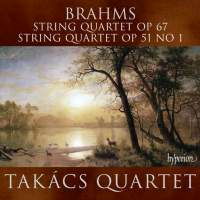
Imperious Assurance
String Quartets
by Brahms
never cease to surprise
ROBERT ANDERSON
Hyperion CDA67552
|

|
Brahms laboured long over a first publishable quartet, as over a first symphony. Legend has it that twenty quartets were destroyed along the way, probably each a hundred per cent finer than works readily put out by his contemporaries. In both cases he ended up in C minor, a key he visited seldom, and mostly in barnstorming mood, breathing sound and fury, thoroughly conscious that his supporters saw him as inheriting Beethoven's mantle. It so happens that this is the Brahms most according to current performance practice, where there is much excitement and brilliance but less occasion for dalliance or introspection.
So the outer movements of Op 51 No 1, where the quartet writing strives again and again to be orchestral, have all the verve and intensity this fine team can give them. The opening of the finale, for instance, has an imperious assurance that admits not a moment's doubt.
Listen -- Brahms: Allegro (Op 51 No 1)
(track 8, 0:00-1:29) © 2008 Hyperion Records Ltd
Not quite so successful is the strangely wayward third movement, where Brahms's 'molto moderato e comodo' gets too little attention.
Listen -- Brahms: Allegretto molto moderato e comodo (Op 51 No 1)
(track 7, 0:00-1:39) © 2008 Hyperion Records Ltd
It is an interesting fact that the quest for authenticity in performance has as yet made little impact on the later nineteenth century. Tempos are nearly always too fast.
It is a joy to see from the booklet how happily the Takács players can smile at the camera. The second violin and cellist have every reason to do so, since both were founder members of the Quartet more than thirty years ago. Based now in Boulder, Colorado, the team might have smiled more at the opening Vivace of Brahms in B flat, where the composer is rhythmically at his most intricate and teasing. Contemporaries found him impossibly complex, and I remember laughing out loud when first playing cello in the work and, imagining I had successfully sorted all Brahms's conundrums, coming across a final one that floored me (anyone with a score can track it down).
Geraldine Walther has been with the team only three years. But she richly deserves the luxurious gift of a solo Brahms gave her in the third movement.
Listen -- Brahms: Agitato. Allegretto non troppo (Op 67)
(track 3, 0:00-1:46) © 2008 Hyperion Records Ltd
The B flat finale is a set of variations on an innocent tiddler of a theme that looks after itself long enough to establish its separate identity before admitting it is really first cousin to the opening tune of the work. Brahms's craftsmanship establishes the family relationship with a deceptive ease yet never ceases to surprise.
Listen -- Brahms: Poco allegretto con variazioni (Op 67)
(track 4, 5:54-7:34) © 2008 Hyperion Records Ltd
And that, sadly, is Brahms's last published equation for string quartet.
Copyright © 14 December 2008
Robert Anderson, Cairo, Egypt
 BUY CLASSICAL CDS ONLINE
CD INFORMATION: TAKÁCS QUARTET - BRAHMS STRING QUARTETS
BUY CLASSICAL CDS ONLINE
CD INFORMATION: TAKÁCS QUARTET - BRAHMS STRING QUARTETS
Record Box is Music & Vision's
regular series of shorter CD reviews
| 
